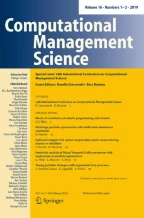Abstract
Approximation techniques are challenging, important and very often irreplaceable solution methods for multi-stage stochastic optimization programs. Applications for scenario process approximation include financial and investment planning, inventory control, energy production and trading, electricity generation planning, pension fund management, supply chain management and similar fields. In multi-stage stochastic optimization problems the amount of stage-wise available information is crucial. While some authors deal with filtration distances, in this paper we consider the concepts of nested distributions and their distances which allows to keep the setup purely distributional but at the same time to introduce information and information constraints. Also we introduce the distance between stochastic process and a tree and we generalize the concept of nested distance for the case of infinite trees, i.e. for the case of two stochastic processes given by their continuous distributions. We are making a step towards to a new method for distribution quantization that is the most suitable for multi-stage stochastic optimization programs as it takes into account both the stochastic process and the stage-wise information.
Similar content being viewed by others
Notes
Here we consider the conditional Gaussian distribution that depends on the historical values \(\xi ^{t-1}\) but not on the bounds in which these historical values are lying. To improve the approximation one may construct a distribution function conditional on the bounds \([b_{1,i_1-1},b_{1,i_1}],\,[b_{n_2,i_2-1},b_{n_2,i_1}]\),...,\([b_{n_{t-1},i_{t-1}-1},b_{n_{t-1},i_{t-1}}]\) of the stochastic process.
References
Ermoliev Y, Ermolieva T, Fischer G, Makowski M (2010) Extreme events, discounting and stochastic optimization. Ann Oper Res 177(1):9–19
Fort J-C, Pagés G (2002) Asymptotics of optimal quantizers for some scalar distributions. J Comput Appl Math 146 (2):253–275
Genz A (1992) Numerical computation of multivariate normal probabilities. J Comput Graph Stat 1:141–149
Graf S, Luschgy H (2000) Foundations of quantization for probability distributions. In: Lecture notes in mathematics, vol 1730. Springer, Berlin
Heitsch H, Römisch W (2009) Scenario tree modeling for multi-stage stochastic programs. Math Progr 118:371–406
Hochrainer S, Pflug GCh (2005) Optimizing financial strategies for governments against the economic impacts of natural disasters in developing countries. In: Paper presented at the IIASA-DPRI conference, Beijing, China, pp 14–18 (September 2005)
Lipster RS, Shiryayev AN (1978) Statistics of random processes, vol 2. Springer, New York. ISBN 0-387-90236-8
Luschgy H, Pagés G, Wilbertz B (2010) Asymptotically optimal quantization schemes for Gaussian processes. ESAIM Probab Stat 14:93–116
Mirkov R, Pflug GCh (2007) Tree approximations of stochastic dynamic programs. SIAM J Optim 18(3):1082–1105
Pflug GCh (2010) Version-independence and nested distributions in multi-stage stochastic optimization. SIAM J Optim 20(3):1406–1420
Pflug GCh, Römisch W (2007) Modeling, measuring and managing risk, 301 pp. World Scientific Publishing, Singapore. ISBN 978-981-270-740-6
Pflug GCh, Pichler A (2012) A distance for multi-stage stochastic optimization models. SIAM J Optim 22:1–23
Pflug GCh, Pichler A (2011) Approximations for probability distributions and stochastic optimization problems. In: Consigli G, Dempster M, Bertocchi M (eds) Springer handbook on stochastic optimization methods in finance and energy. International Series in OR and management science 163 Chapter 15, pp 343–387
Rachev ST (1991) Probability metrics and the stability of stochastic models. In: Applied probability and statistics. Wiley series in probability and mathematical statistics. Wiley, Chichester. ISBN 0-471-92877-1
Römisch W (2010) Scenario generation. In: Cochran JJ (ed) Wiley encyclopedia of operations research and management Science. Wiley, Chichester
Szántai T (2000) Improved bounds and simulation procedures on the value of the multivariate normal probability distribution function. Ann Oper Res 100:85–101
Villani C (2003) Topics in optimal transportation. In: Graduate studies in mathematics, vol 58. American Mathematical Society, Providence, RI. ISBN 0-8218-3312-X
Voronoi G (1907) Nouvelles applications des paramétres continus á la théorie des formes quadratiques. Journal für die Reine und Angewandte Mathematik 133:97–178
Acknowledgments
The author is grateful to o.Univ.Prof. Dr. Georg Ch. Pflug for his continuous supervision, inspirational advices and guidance at ISOR. She would also like to thank IIASA’s RPV group for their support and valuable feedbacks during the development of applications in the field of catastrophic risk-management.
Author information
Authors and Affiliations
Corresponding author
Rights and permissions
About this article
Cite this article
Timonina, A.V. Multi-stage stochastic optimization: the distance between stochastic scenario processes. Comput Manag Sci 12, 171–195 (2015). https://doi.org/10.1007/s10287-013-0185-3
Received:
Accepted:
Published:
Issue Date:
DOI: https://doi.org/10.1007/s10287-013-0185-3
